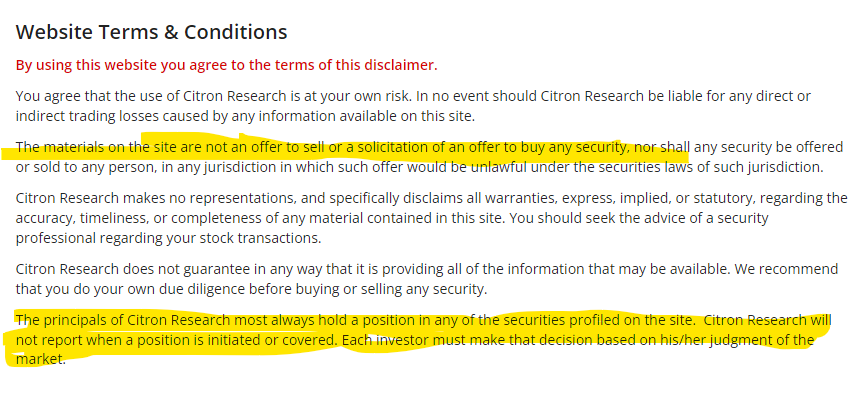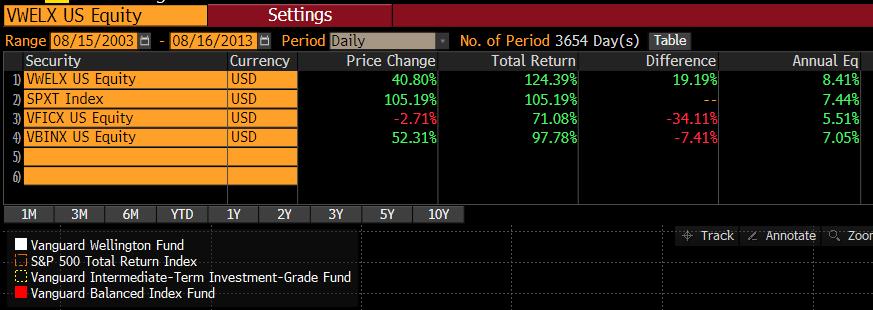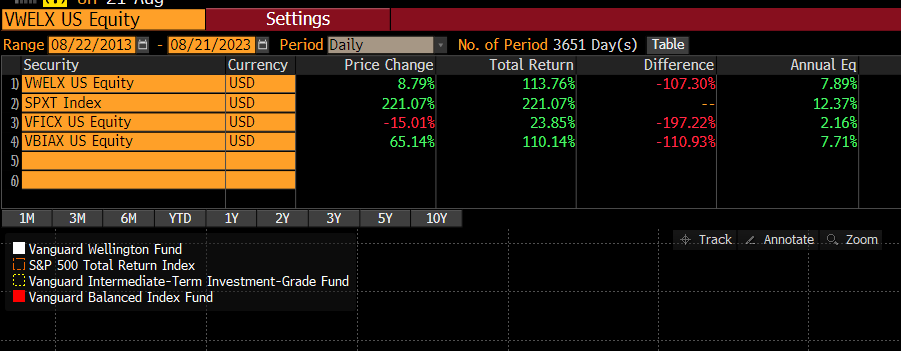
thepupil
Member-
Posts
4,184 -
Joined
-
Days Won
4
Content Type
Profiles
Forums
Events
Everything posted by thepupil
-
No, my excess liquidity is ~60% of my account. I could take out half my equity (and be 200% long) and still have a little breathing room. I would obviously not do this, but I definitely don't need to maintain the amount of margin you think. I mean really it's just that I have about 25% of my account in non-marginable securities. This makes sense as those are illiquid and trade OTC. they should be fully paid. I think IBKR is quite generous with margin, particularly portfolio margin. I recently had a 70% position in EQC in this same account, all of which borrowed. Hedging with options made the margin requirement equivalent to the non-put protected amount. I've taken a >100% position in PSTH in this account (once again protected with puts) to get a bunch of SPARC'ies one day. Just buy some 30% OTM puts on your stuff and watch the required margin collapes Test out what your margin does if you buy some January 2026 $90 PDD puts for $7 (5% of the current stock price) EDIT: FWIW i don't even see PDD as a high maint margin security. It's 20% for me.
-
35% isn’t that bad, I have no margin borrowed at this time and my maintainance margin is 40%. This is an aggregate of 3 100% margin positions that trade OTC and the rest being ~20%. Largest position is 15% and account owns 12 stocks. Ideally I should put the 100%ers in IRA’s, but don’t use enough mgn anymore for it to matter.
-
https://www.wsj.com/articles/SB898287577264756000 Buffett issued shares for Gen Re after a big run up in his stock and peak. Article mentions Berkshire running up to $80k, $37k 1998 BV, also note that the inputs to BV were expensive large cap stocks.
-
Awesome! I love it.
-
fair counterpoint, definitely know some folks who fit this narrative. real takeaway is that drinking a lot in college leads to strong professional outcomes
-
I went to a top 10 school. my fraternity brothers (all about 35 now) quant trader Restructuring lawyer VC *2 Equity research consultant dentist * 2 pain medicine doctor senior person at asset manager founder w/ decent exit to FAANG, started 2-3 companies so far wanderer (w/ varying degrees of employment) teacher don't know big law engineer @ defense company executive at railroad med tech executive CEO small software co non-profit stuff / development mgt consultant at MBB *2 now lots of these people would have been successful if they went to public school and plenty had lots of family connections / help, but it's tough for me to conclude the money our families spent on education was a waste. most of the above, except for the engineers have "useless" liberal arts degrees. I'd struggle to find someone making less than $400K (exception: teacher/nonprofit folks) and there are a few nice right tail outcomes as well. most are doing what they wanted to do or at the very least making a lot of $$$ in prep to do what they want to do. my school cost about $320K now for 4 years. we don't live in a meritocracy and the network / opportunities offered by elite education have significant value. maybe it won't always be like that, but it's hard to undo 300-400+ years of precedent. it's not necessary to succeed, but the base rate for success seems quite high based on my anecdata and objective rankings of schools w/ median income at 10 years after graduation. and it's practically free for families making <$100K at this point. <$150K at the best schools. so from my standpoint, most people who get in, should go. some edge cases (like say someone whose family makes $200K, but doesn't have a lot of savings and the person knows they want to be something where the network/branding/etc is of little value). but if family makes $700K or $100K, then I'd say that person should still go. pls excuse the poor writing/punctuation, wrote this quickly b/w stuff.
-
one reason to cover as an activist short is that you can find yourself overly successful in attracting other people shorting and risk borrow drying up, so if you got a portion of your profit in exchange for sharing your thesis, better to take the bird in hand.
-
yes, we agree here, he should not have lied about "staying long until X" and sold it that day. he should not have said he didn't take compensation from any HF's when in fact he did. he should not have said he managed external capital when he didn't (or implied it, unclear to me he actually said it). he definitely lied a few times, but much of the complaint seem very weak and has pretty big implications for anyone who speaks publicly about stocks with any kind of specificity.
-
it's not a question of ethics though is it? the law does not mandate ethics. it mandates following the law. what you or I consider distasteful doesn't matter, right? no one faces 20 years of jail time for cheating on one's spouse, even if it is unethical. I doubt that I'd like to spend any time with Left or have him marry my sister. lots of people do unethical things (some of what Left did I take issue with, some i do not), but not all of them are publicly charged by our government and facing up to 20 years in jail. e can't arbitrarily redefine what market manipulation is just because we don't like someone or don't like their investment strategy. that's what it feels like to me is happening here and that's why I hope he successfully defends himself. also I do agree with the critics that this will certainly silence potential short activists who are already the subject of enough persecution by companies and regulators. It feels the SEC is hollowing out a community that in aggregate likely does more to bring down bad companies than the SEC itself does.
-
yes. 2/26 = 7.6%. Making 7.6% in a day is a better IRR than making 3.5x in say 3-5 years...IF you have enough ideas to reinvest at similarly insane IRR's, perfectly reasonable to close out that day. Let's say Andrew's skill/podium were good for 7% every 2 months. in two years that's 125% return while only being exposed to one company on a fraction of trading days. he made a fair bit of money using only is own capital so it was effective, potentially even rational to monetize the short term moves in the stock. Saying something is worth $100 to the public does not carry any obligation to hold it to $100. one could certainly argue that it's 100% rational to do what he did and take the better risk adjusted returns particularly given the path dependency of shorting and degree tow which most ideas were shorts. that's what concerns me about this. the SEC seems to have made portfolio management a crime. if 5-10% in a day is too small a move, then what's the line? what about 20% in a week? a month? 3 months? to my knowledge the SEC has not mandated a holding period for a position on which you state an opinion of intrinsic value. nor should they. should one be penalized for effectively moving the market? no. if you say something false or just make shit up to try to then yes (which is my understanding of the law in place). the SEC seems to be shifting that with this case. I think SEC just doesn't like activist shortselling and needs something to show for their investigations these last three years. And there are clear instances where Left did lie...but not really about stocks, about stuff like not being compensated by HFs or implying that he managed external capital when he didn't. there I think it's more clear cut, but those don't strike me as serious as the other allegations. about the companies themselves, the SEC offers very little in their complaint regarding him saying untruthful things. as some bloggers and matt levinge have pointed out, he was often right (and sometimes wrong) in his analysis of companies, like any of us.
-
okay. just wanted to make sure we're looking at same thing. don't expect us to agree on this.
-
can you point me to what you are reading? all i can find is the below. I have the opposite impression from this. defense is basically "he was right on the companies in most cases" and "no need to disclose trades", with which i agree. https://www.cnbc.com/2024/07/29/andrew-left-citron-capital-securities-fraud-los-angeles.html
-
I think this is a good thread on the matter. https://x.com/compound248/status/1816878276662497773
-
so I guess my idea of manipulation is making false statements about the company. I don't consider a price target in itself (which is subjective) to be a false statement or misleading. the complaint details Left coming up with a sensational price target (without basis) to move the stock. that's the crux here. But can an opinion on where a stock should trade be false and misleading? If you say you're still "extremely short" something when you've covered 75% of your position, is that illegal? what if beforehand you were simply even more extremely short? I would assume that a complaint of this nature would include people pumping up a stock (or trying to get it down) by making false/misleading statements about the company the complaint alleges that Citron's intent to buy/sell the securities at the time of release of information was not disclosed to investors. the "stupid disclaimer" does just that. just seems like tons of leaps/grey areas/points of concern that when brought to logical conclusion would apply to almost anyone, but in the end, he's going down. no one wins against SEC once they come after you. he's done.
-
also, isn't this the whole reason every activist short or long has something like this in their materials/website?
-
Left seems to be the most egregious in monetization of short term moves, but I did not, until today, know that is was illegal to publish a price target and then take an action inconsistent therewith. I think there's enough false statements made for SEC to have a case, but I find some of the implications of what is legal / not legal to be both disturbing and far reaching. Here's the full complaint. https://www.sec.gov/files/litigation/complaints/2024/comp-pr2024-89.pdf What I find most interesting about this is the idea that having a price target and then selling / covering at some price different from that price target is "false and misleading" (see the appendix) By this definition, if I on twitter said that I think AIV is worth $16 and then sold half my position at $9, having bought at $6.50, I've made a false and misleading statement, when in fact, I'm merely taking profits. Now if i did that 25 times and used sensational language and did it on small moves on a number of stocks over very short time frames and told my colleagues i was taking retail investors money like candy from a baby, and i had 100K twitter followers instead of 7K, then maybe the SEC would come after me. But a lot of the individual acts by left here don't seem "false and misleading" to me.
-
I agree w/ this, but I'll always be at least like 80% equities because can't time the re-entry. curious if you think we're still in a time of "volatile and/or rising inflation?"
-
haha, those were some good bonds...FWIW I'd probably leave the last two points to someone else.
-
if we include 2022, indeed S&P 500 equal weight is < t-bills at 3% ish, SPY at almost 8%/yr, 3% ish for stocks outside US. EM and bonds are negative. Gold a nice 11%/yr. so yea, I agree with you over that time frame that non mag7 stocks not really worth owning vs t-bills (with the benefit of hindsight).
-
not sure I agree. since the beginning of 2023, bonds have been worse than t-bills, Equal Wgt S&P500, ACWI ex United States, EM stocks, Gold. it's not just a Mag7 thing. I've been building bonds all the way over that time period. The bond index is now my single biggest line item (but still only like 9% of my nut), but let's not pretend that bonds have done well or added any benefit to relative to other asset classes thus far. so far it's been wrong to have any. may be different going forward. only been a couple of years with +real rates.
-
yep, was aware of the 1256 (hence no wash sales). I definitely can do it more optimally and need to sit down build an excel sheet/plan. @aws objective is to have no economic gains/losses, not use "substantially identical" securities and have an array of unrealized gains/losses to choose from.
-
another factor is XLF flows. When Berkshire has a short term run-up (or down) it's often in tandem w/ XLF (driven by big banks, asset managers, payments, etc)
-
example: I went long about $xxxK notional of $VT via (synthetic long, short put long call) and short the same of SPX via futures options expiring in december. so long world / short US, not the exact same security, but about 65% or so pretty similar since world is 65% US. I'm invested mostly in US in all accounts including tax advantaged so being short US for this trade wasn't a concern. I lost $xxK on the short SPX leg and was up $xxK on the $VT leg at time I closed out the SPX short and realized $xxK of losses. I then re-established a similar short position in a slightly different US based index (even though 1256 contracts don't have wash sales so this was not necessary). Assuming the $VT leg is still profitable at expiry, I can choose to exercise in December (which will require borrowing a bit of money) which will build the gain into the VT shares but allow me to control timing of realization. there's a number of iterations. I think the "right" way to do this would be to diversify across tons of highly correlated pairs including individual stocks, but I'm optimizing for pre-clearing as few things as possible at my employer.
-
are we "fixating" on bonds or just moving from #neverbonds to #maybesomebonds? of course, since I wrote that, SPY is +30.1% and bonds are +6.8%, but it's also been 9 months and not 7-10 years.
-
I manage my money as well as that of my retired parents. Their taxable portfolio is ~50% basis / ~50% unrealized appreciation but the positions at the top (Berkshire / Google / Apple / Black Stone Minerals / Microsoft etc) are 5% - 30% basis with rest in unrealized appreciation creating significant tax friction for selling. Nevertheless as florida retirees, paying 15-23% on trims isn't so terrible and is portfolio is relatively tax efficient. My own portfolio is traded much more aggressively and is much more concentrated and far less tax efficient; on top of that I'm in a high tax state. My own taxable's portfolios CAGR is much higher than theirs (last 5 years = 25%/yr for taxable, last 5 years = 13% / yr for theirs). TO be clear, this is my main taxable account's CAGR and not my whole portfolio and reflects a very favorable time frame and is obviously not a sustainable return. Way too high. Will be much lower. On a longer time frame, I'm more like SPY +3% (of which I'm proud because as a value luddite, I do the whole "OP'd without tech" nonsense) but much of that +3% has likely gone to taxes. I think given the tax inefficiency of my approach, their portfolio's risk adjusted after tax return is better than mine and their approach is probably where I'll shake out eventually. the result of my greater aggression has been compounding at a higher rate, but I've also been paying taxes as a I go whereas they build a favorable form of leverage with a DTL. It takes a pretty big delta in returns to overcome taxes. Nevertheless, I do not prioritize tax efficiency because a) so far more or less have paid for the increased taxes w/ better returns b) have built a (top 1% for age I suspect) amount of tax advantaged accounts from $0 over last 13 years so a portion of my investing will always be tax agnostic. Lately, I've introduced a tax overlay on my own portfolio where I'm long and short various indices, trying to generate $0 of net PnL but lots of gross positive and negative pnl. thus far this has been moderately successful and allowed me to sell all my highly appreciated berkshire with minimal tax friction, but it's also because I just haven't made that much money this year and paid lots of taxes in the past. long way of saying, I kind of get both sides of this debate. regarding berkshire, my view of the core businesses competitive position (Burlington vs UNP, GEICO vs Progressive, BHE/utes on an absolute basis) etc has dimmed relative to 3,5,7 years ago. My view of apple's valuation has as well, and the P/B multiple is quite healthy particularly considering just how much is in liquid stuff available at market outside of berkshire. the DTL is more likely to be realized / real as Buff dog trims Aapl, so you're paying quite a premium to an already rich valuation for a pretty big portion of the book. I've been at $0 of berkshire 2x in 13 years. I may regret it. it remains my parents largest position. I expect it to do okay from here over the long term.




